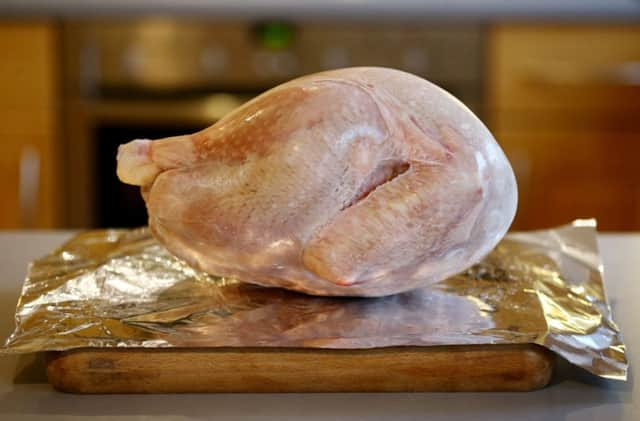Six in 10 Scots risk food-poisoning from turkey


More than 60 per cent of Scots are putting themselves at risk of food poisoning by failing to defrost their frozen turkey properly, the Food Standards Agency (FSA) has warned.
A total of 560,000 people in Scotland – 62 per cent of those who buy their meat frozen – do not follow FSA guidelines on thawing their Christmas bird, putting them out to defrost on the counter, or in the garage or even the garden shed, which can provide a platform for bacteria such as campylobacter to spread.
Advertisement
Hide AdAdvertisement
Hide AdMeanwhile, only around one third of people in Scotland who purchase a frozen turkey are getting it right by defrosting the meat in the fridge.
The FSA has declared today to be National Defrost Your Tur-key Day, urging people to start the thawing process in time for Christmas so that the bird is not still part-frozen when it is put into the oven on Thursday morning.
Jacqui McElhin-ey, Food Safety Expert at the Food Standards Agency Scotland, said: “We all love our turkey dinner at Christmas and this year should be no exception.
“It’s the little things you do that can make a real difference. So if you make sure that your turkey is defrosted safely and in good time, you can enjoy your meal happily and safely.”
A total of 55 per cent of Scots said they will be eating turkey this Christmas – with 31 per cent opting for a frozen bird.
CONNECT WITH THE SCOTSMAN
• Subscribe to our daily newsletter (requires registration) and get the latest news, sport and business headlines delivered to your inbox every morning
A typical large turkey weighing around 11kg takes two days to defrost. If it is not fully defrosted when it goes into the oven, it may not cook evenly and harmful bacteria could survive the cooking process.
The FSA hopes National Defrost Your Turkey Day will prompt Christmas cooks to start thinking of the defrosting process in plenty of time to avoid getting caught out on the day.
Advertisement
Hide AdAdvertisement
Hide AdMs McElhiney added: “It is really important that when you have a frozen turkey it is fully defrosted.
“We also advise people to get a meat thermometer as this will ensure the turkey is getting to the right temperature.
“Raw turkey should always be put in the bottom of the fridge until ready to use. If it is in the fridge defrosting you don’t want all the juices dripping on other foods. It is also important to keep it covered.
“Please ensure that you wash your hands thoroughly and clean your work surfaces when handling raw meat.”
She added: “We all love our turkey dinner at Christmas and this year should be no exception.”
Chef Mark Greenaway, who has appeared on TV programmes including the Great British Menu and has two restaurants in Edinburgh, said: “I think one way to properly enjoy Christmas is by taking the time to prepare a lot of it in advance so you aren’t running about at the last minute panicking, and trying to squeeze everything in your oven at once.
“So part of the preparation should be to properly defrost your Turkey by taking it out the freezer today and allowing it to thaw out properly in the refrigerator. Or get to know your local butcher and pick up your fresh Turkey on Christmas Eve, saving you room in the fridge.”
The FSA guidelines state that raw turkey should always be put in the bottom of the fridge until it is ready to use, while cooks have also been warned not to wash poultry before using it for fear that splashes of water contaminated with bacteria could reach other surfaces in the kitchen.
Advertisement
Hide AdAdvertisement
Hide AdAn FSA report released in November revealed that up to 78 per cent of fresh supermarket chickens are contaminated with the bug campylobacter, which is responsible for an estimated 280,000 cases of food poisoning and as many as 100 deaths each year in the UK.
SCOTSMAN TABLET AND IPHONE APPS